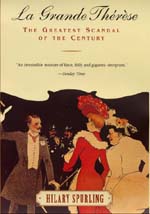 This small book—in essence, an extended essay—serves up with wit and a novelist’s delight the story of a scandal that almost toppled France’s Third Republic. A century ago, Thérèse Humbert held a seemingly impregnable position in French society. Doyenne of the Parisian social scene, intimately connected to French political life through her father-in-law, who was minister of justice, Humbert embodied the people’s dreams like a modern Hollywood star. But it was all a charade: Thérèse had spread the notion that she was heiress to an immense fortune—and on that basis she borrowed large sums of money—but she was in fact the daughter of a poor family from a small town in Languedoc.
This small book—in essence, an extended essay—serves up with wit and a novelist’s delight the story of a scandal that almost toppled France’s Third Republic. A century ago, Thérèse Humbert held a seemingly impregnable position in French society. Doyenne of the Parisian social scene, intimately connected to French political life through her father-in-law, who was minister of justice, Humbert embodied the people’s dreams like a modern Hollywood star. But it was all a charade: Thérèse had spread the notion that she was heiress to an immense fortune—and on that basis she borrowed large sums of money—but she was in fact the daughter of a poor family from a small town in Languedoc.
Through a psychologically astute portrait, author Hilary Spurling grants her readers entry into this fin-de-siecle world of French society and this truly odd tale of one woman’s rise from rags to riches. We first meet young Thérèse through the eyes of her Languedoc neighbors, who attest to her wily fabulist skills from an early age. Her invention of wealthy relations and her swindling of businessmen and neighbors were, to some extent, acts of necessity, but Thérèse’s dreams of castles and riches lay deep in her psyche. When Humbert’s scam was finally exposed in 1902, fortunes were ruined (including that of the painter Henri Matisse’s in-laws—Spurling came on the tale while researching The Unknown Matisse) and bankers committed suicide. Journalists lavished attention on the case, while popular songs and toys took on the Humbert theme. Spurling beautifully captures both the political interest of Humbert’s grand scandal (the embodiment of latent contradictions in French society, which esteemed both riches and republicanism) and the sheer, exhilarating daring of one woman’s imagination.
This unsigned review appeared originally in Publisher’s Weekly. Reprinted with permission.